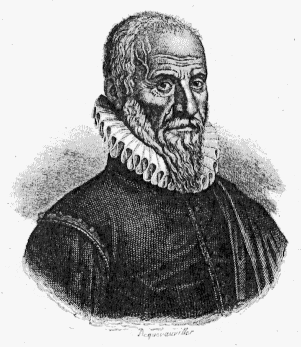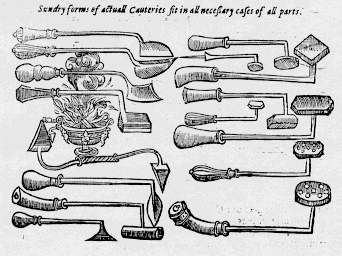Ambroise Pare
Today, a Renaissance surgeon comes to grips with suffering. The University of Houston's College of Engineering presents this series about the machines that make our civilization run, and the people whose ingenuity created them.
The myth that war stimulates invention is fiction. The facts don't bear it out. Yet author Sherwin Nuland tells an ironic story about a case where war did serve innovation. He tells about the 16th-century barber-surgeon Ambroise Paré.
Paré was born in 1510. Life around him was an unending series of small wars. Those wars were being waged with a new weapon: firearms. Shot and shrapnel had come of age, and they were making war more terrible than ever.
Paré trained in Paris as a barber-surgeon. He worked in that dirty, brutal trade while it dealt with new kinds of wounds. Surgeons worked for physicians, and physicians thought gunpowder was poisonous -- that gunshot wounds had to be cauterized with boiling oil. So soldiers, already horribly damaged, were then scalded with boiling oil.
The siege of Turin in 1537 found a very young Paré facing too much carnage. His cauterizing oil ran out, and as a stopgap he tried a cold mix of egg yolks, oil of roses, and turpentine. He accidently created two test groups. As the soldiers healed, the ones who weren't scalded recovered far more quickly.
It was a moment of revelation for Paré. It suddenly hit him that the center of his job as a barber-surgeon was to ease suffering -- a point normally overlooked in his work. Never mind the Latin-based medical orthodoxy of the physicians. A patient in pain could teach him what arcane theories could not. And Paré was a gifted observer.
From that day on, he created a new and humane concept of medicine and surgery. He wrote simply and directly about what he saw -- in French, not Latin. His clear-headed techniques won him acceptance into medical circles. He was given the beachhead he needed to make his ideas part of formal medicine.
Paré's medical conversion was fed by religious conviction. He invented a phrase that's been worn down into a pious cliché. When he said, over and over, "I dressed the wound, but God healed him," he was simply reminding himself where his own abilities stopped.
Paré's lifelong enemy was firearms. Once he wrote:
Wherefore we all of us rightfully curse the author of so pernicious an engine; On the contrary praise those to the skies, who endeavor by words and pious exhortations to [dissuade] kings from their use.
Nuland says of Paré that "he was much less fascinated by the process of disease than by the patient, a fellow human in distress." And so it was that when war touched this man of peace, it created the next leap forward in clinical medicine.
I'm John Lienhard, at the University of Houston, where we're interested in the way inventive minds work.
(Theme music)
Nuland, S.B., Doctors: The Biography of Medicine. New York, Vintage Books, 1988.
Paré, A., The Apologie and Treatise of Ambroise Paré. New York: Dover Publications, Inc., 1968.
Malgaigne, J. F., Surgery and Ambroise Paré. Norman, OK: University of Oklahoma Press, 1965.

Ambroise Paré

A set of Ambroise Paré's cauterizing instruments as shown in: The Works of that Famous Chirurgion Ambrose Parey, London: 1624
(Both images courtesy of the Yale University, Harvey Cushing/John Hay Whitney Medical Library)